Types Of Accumulator Bets
Accumulator bets, often referred to as "accas," are a popular choice among bettors who want to turn small stakes into potentially big wins.
By combining multiple selections into a single bet, the potential payout grows significantly with each added selection.
However, not all accumulators are created equal and in fact, there is a huge range or acca bets you can place.
In this article, we’ll break down the main types of accumulator bets, explain how they work and help you choose the right one for your betting strategy.
Placing A Standard Accumulator Bet
Let’s walk through how to place an Accumulator bet and because it’s the most bet on sport in the UK, we’ll use football as an example and look at upcoming fixtures in the Premier League.
Having looked at the fixtures and done some research, you have decided to pick the following four selections:
- Tottenham to beat Newcastle
- Bournemouth and Everton to draw
- Southampton to beat Brentford
- Arsenal to beat Brighton
To place the bet, just head over to the market at your chosen bookies and then select your predictions. Using Bet365 for this example, this is what your bet slip will look like once you have added the four selections:
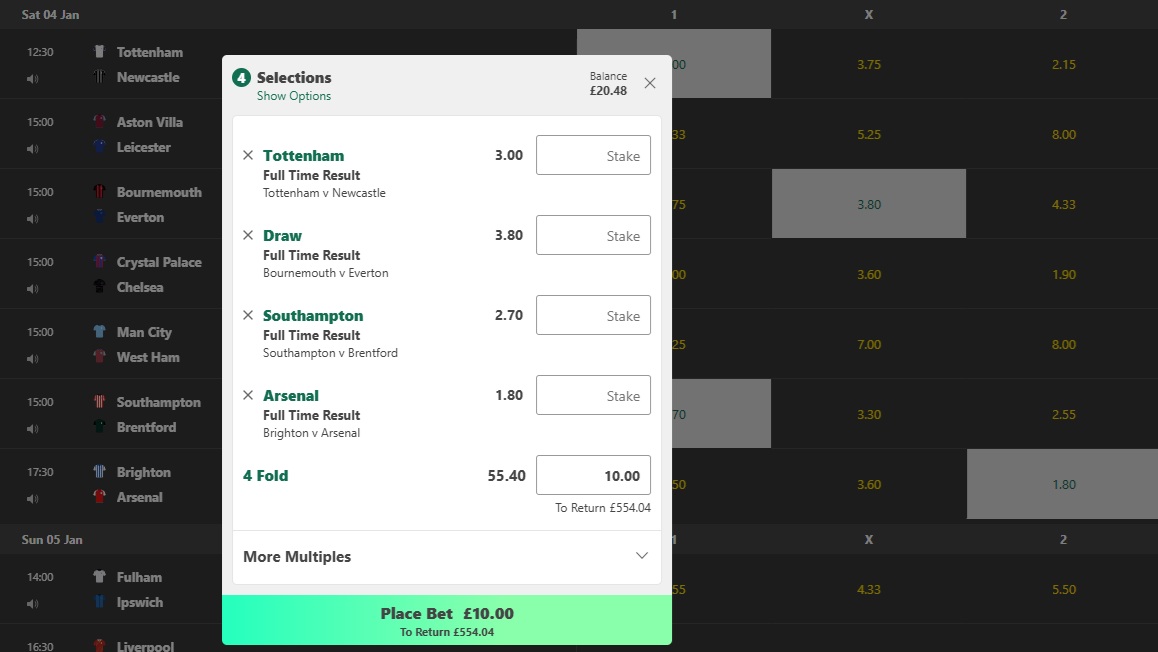
Next, choose the stake you want to use and click the ‘Place Bet’ option and that’s it, you’re done.
Obviously, you can add more selections to make it say a five or six-fold Accumulator.
As we mentioned earlier, you can mix and match the betting markets to form your chosen Accumulator bet. If you were to place the bets from our initial five-fold acca example, this is what the bet would look like:
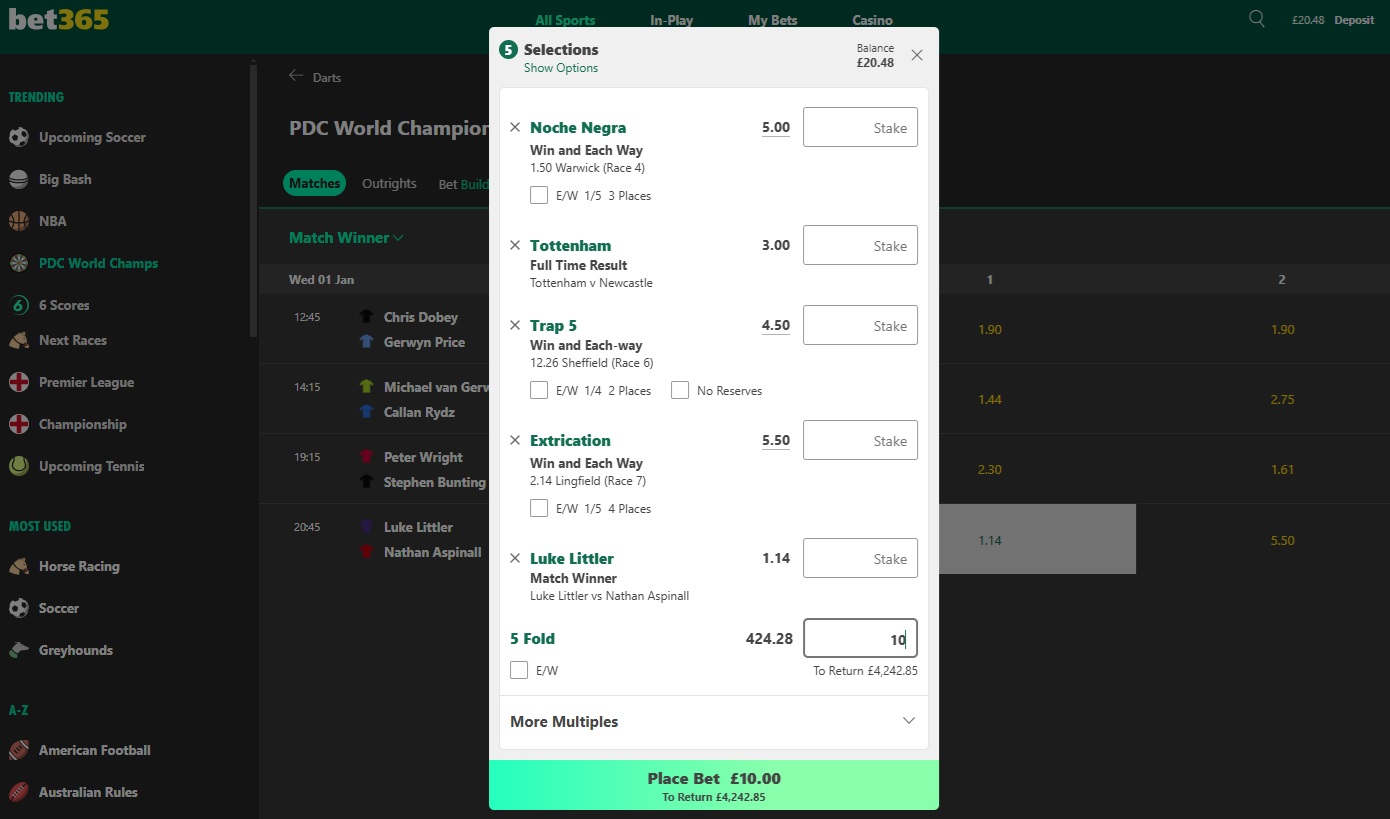
Whilst we have used three different types of markets, you can literally use any sports betting markets you like.
You don’t even have to pick out a result from a given match or race either. You can opt to bet on the winner of the Premier League, the winner of the UK National Hunt Jockeys Championship, the winner of the PGA Golf Tour and the winner of the Rugby Six Nations tournament for example.
Alternatively, you can consider other types of markets. Sticking with the football markets, you could look at first goal scorer, goals scored, fouls, corners or goalkeeper saves. Provided you only pick one selection from each match, you can create an acca from it.
Once you add more than one selection from a specific game, you’re then entering the realms of Bet Builders which isn’t the same as Accumulator bets.
Quite simply, the sky is the limit when it comes to picking what you want to add to an Accumulator bet.
Calculating Accumulator Bet Returns
Accumulator bets are extremely popular with bettors thanks to the potential of huge returns. The common uses of acca bets include picking football results on a weekend, horses on a Saturday and also Horse at big festival meetings such as Cheltenham.
The returns on Accumulator bets are much bigger than single bets thanks to odds involved.
Thankfully, calculating the potential returns from Accumulator bets is pretty easy. It’s as straight forward as multiplying the odds of your selections by the bet stake you’ve used.
Using our previous four-fold Accumulator example with the football, let’s look at the returns for the individual bets compared to the Accumulator bet:
| Bet | Odds | Profit on a £10 Stake |
| Single bet on Tottenham to beat Newcastle | 3.00 | £20 |
| Single bet on Bournemouth to draw with Everton | 3.80 | £28 |
| Single bet on Southampton to beat Brentford | 2.70 | £17 |
| Single bet on Arsenal to beat Brighton | 1.80 | £8 |
| Four-fold Acca on the above bets | 55.40 | £544.00 |
Let’s go through the four single bets to start with. After placing £40 in stake money (£10 per single bet), you would end of with a profit of £73 (£20 + £28 + £17 + £8).
Alternatively, using the above four single bets in an Accumulator would return a £544 profit. The difference is vast as the odds are multiplied – 3.00 x 3.80 x 2.70 x 1.80 = 55.40. All that extra profit potential for just a £10 outlay.
Of course, this makes the Accumulator look extremely attractive. However, don’t forget, one loss and the whole bet goes out of the window.
Had you placed four single bets and only three of them won, you would still make a profit. It might not be a huge amount but it’s still a profit.
Just to make sure you’re okay with the numbers, let’s take a look at calculating the odds and returns for the five-fold example with the mixed sports involved:
| Bet | Odds | Profit on a £10 Stake |
| Noche Negra to win the Warwick horse race | 5.00 | £40 |
| Single bet on Tottenham to beat Newcastle | 3.00 | £20 |
| Trap 5 to win the Sheffield dog Race | 4.50 | £35 |
| Extrication to win the Lingfield horse race | 5.50 | £45 |
| Luke Littler to beat Nathan Aspinall | 1.14 | £1.40 |
| Five-fold Acca on the above bets | 424.28 | £4232.80 |
So, in this example, the five single bets would return a profit of £141.40 (£40 + £20 + £35 + £45 + £1.80).
However, the five-fold acca would multiply the odds (5.00 x 3.00 x 4.50 x 5.50 x 1.14) to give total odds of 424.28. After deducting your stake of £10, you would make an astonishing £4,232.80.
As you can see, calculating the returns from a standard Accumulator is quite easy. However, an alternative to working these things out for yourself is to input the figures into the Outplayed Accumulator Calculator.
Using the Accumulator Calculator is nice and easy too. You just need to input the odds for your selections and enter your stake and the calculator will do the rest for you.
We entered the odds from our four-fold football acca example above and this is what it looks like:
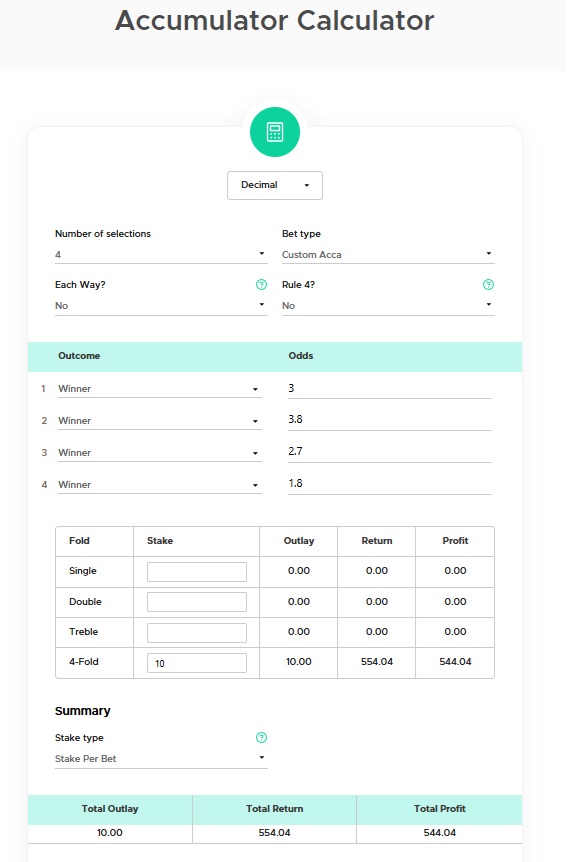
Advantages And Disadvantages Of Accumulator Bets
Given the popularity of Accumulator bets, you’d think that it must be a no brainer to place them. However, as is the case with any types of bets, there’s benefits and drawbacks to them so let’s take a look.
Advantages
- The multiplication of the odds provides potential for massive profits
- Straight forward to place
- Plenty of sports markets to choose from
- Can provide good odds when betting on favourites
Disadvantages
- Each leg of your Accumulator bet must win for any returns
- Hard to land so carry a higher risk than single bets
Other Types Of Accumulator Bets
So far we’ve looked at the box standard type of Accumulator Bet. However, there are other variations that are also known as multiple bets.
These include the following:
- Trixie Bet
- Patent Bet
- Yankee Bet
- Lucky 15 Bet
- Canadian / Super Yankee Bet
- Lucky 31 Bet
- Heinz Bet
- Lucky 63 Bet
- Super Heinz Bet
- Goliath Bet
Trixie Bets
A Trixie bet requires you to pick three selections which are combined into one bet. Trixie bets tend to be used in horse racing and football the most.
As mentioned, your three selections combine to make one bet made up of four bets as follows:
- 3 Double Bets
- 1 Treble Bet

As an example, there’s a big weekend of Premier League football coming up and you fancy having a bet on three teams you regularly watch. Your eye has been taken by the fixtures for Tottenham v Newcastle, Aston Villa v Leicester and Brighton v Arsenal.
You feel that all of the home teams will win these fixtures so you decide to select Tottenham at odds of 3.0 (2/1), Aston Villa at odds of 4.0 (3/1) and Brighton at odds of 6.0 (5/1). When you place your Trixie bet, the combinations will be made up as follows:
Double Bet 1 – Tottenham and Aston Villa to win
Double Bet 2 – Tottenham and Brighton to win
Double Bet 3 – Aston Villa and Brighton to win
Treble Bet – Tottenham, Aston Villa and Brighton to win
When using a Trixie bet, the little bonus compared to a standard Accumulator bet is that you can afford for one of the teams (legs) to lose. Obviously, the objective is for all four bets to come in.
Another thing to take note of is that unlike a normal Accumulator bet which requires one stake, the Trixie needs you to place four stakes (one for each combination). Therefore, a £1 Trixie bet would actually cost £4 to place.
Calculating Trixie Bets
To calculate the returns from a Trixie bet, you need to multiply the odds of each selection for each double and the treble. Based on the odds from our example, the potential returns would look like this with a £1 unit stake:
Double 1: £1 x Tottenham 3.0 x Aston Villa 4.0 (1 x 3.0 x 4.0) = £12 returns
Double 2: £1 x Tottenham 3.0 x Brighton 6.0 (1 x 3.0 x 6.0) = £18 returns
Double 3: £1 x Aston Villa 4.0 x Brighton 6.0 (1 x 4.0 x 6.0) = £24 returns
Treble: £1 x Tottenham 3.0 x Aston Villa 4.0 x Brighton 6.0 (1 x 3.0 x 4.0 x 6.0) = £72 returns.
Don’t forget, if any of the above were to win, you would need to deduct £4 from the returns to determine the profit.
So, now you have the calculations needed to work out the potential returns on a Trixie bet. However, you can make life a little easier for yourself by using the Outplayed Trixie Bet Calculator.
For a more in-depth look at the ins and outs of this type of bet, please read our Trixie Bet article.
Patent Bets
Patent bets are another combination bet similar to the Trixie bet. As with the Trixie bet, you’re picking three selections for your bet. However, this time your bet will include Single bets to make a total of seven bets rolled into one.
Once selected, your three choices will create these bet combinations:
- 3 Single Bets
- 3 Double Bets
- 1 Treble Bet
Thanks to the addition of single bets, the coverage of your bet widens and one winner will provide a return on your total bet.
If two win, you then get returns on two single bets and a double. The gold medal would be if all three of your choices won in which case all seven combinations of the bet win and it’s time to celebrate.
NOTE – each leg of the bet carries its own stake so a £1 Patent bet stake would total £7 to cover the 3 single bets, 3 double bets and the treble bet.
Calculating Patent Bets
The maths involved in calculating the potential returns on a Patent bet is relatively straight forward. You just need to multiply the odds of each leg of the bet and then add the outcomes of each leg together for the total should all the bets win.
Let’s say you’ve decided to have a bet on three of the EFL Championship matches. You’ve picked Hull at odds of 5.50, Blackburn at odds of 3.20 and Millwall at odds of 3.50.
Let’s do a high-level run through of what the returns calculations look like:
Singles Returns
- Hull win: £1 (stake) x 5.50 (odds) = £5.50 returns
You need to repeat this for the remaining two single bets.
Doubles Returns
- Hull & Blackburn win: £1 x 5.50 x 3.20 = £17.60 returns
You need to repeat this for the remaining two double bets.
Treble Returns
- Hull, Blackburn & Millwall win: £1 x 5.50 x 3.20 x 3.50 = £61.60 returns
Remember to deduct the total stake from any returns. In this case, you need to deduct £7 from any returns.
Whilst working out the possible returns yourself is possible, it’s probably easier to use the Outplayed Patent Bet Calculator.
If you’d like a full breakdown of the calculations or a more in-depth look at Patent bets, read the full article on Patent bets.
Yankee Bets
Stepping up to the next level of multiple bet types, the Yankee bet is one of the more advanced Accumulator bets.
The Yankee bet can be used on a variety of different sports, but it’s mainly used in football and is extremely popular in horse racing betting.
With a Yankee bet, you are picking four selections that will combine into eleven individual bets.
- 6 Double Bets
- 4 Treble Bets
- 1 Four-fold Bet
The Yankee does provide a reasonable safety net in that you only need two winners to get a return. Here’s what outcomes are possible:
| Outcome | Winning Combination |
| No winners or 1 winner | The bet loses |
| 2 winners | 1 winning double |
| 3 winners | 3 winning doubles & 1 winning treble |
| 4 winners | 6 doubles, 4 trebles & 1 four-fold |
IMPORTANT – Any stake you enter applies to each leg of the Yankee bet. Therefore, a £1 stake will cost a total of £11.
Calculating Yankee Bets
To calculate the potential returns from a Yankee bet, you need to multiply the odds within each leg of the bet and then add any winning legs together to get your winning odds and returns.
Let’s put the theory into practice and use a real example of a racecard from Lingfield Races. These are the four horses you’ve chosen:
- Nogo’s Dream at odds of 5.0 (4/1)
- Charlie Mason at odds of 4.0 (3/1)
- Star Pupil at odds of 7.0 (6/1)
- Mullwarcher at odds of 3.5 (5/2)
For this walkthrough we’ll just take you through one double, one treble and the four-fold using a £1 stake. You would need to repeat the steps for each for a full breakdown.
Double Returns
- Nogo’s Dream & Charlie Mason win: £1 x 5.0 x 4.0 = £25 returns
Repeat this for the remaining five doubles.
Treble Returns
- Nogo’s Dream, Charlie Mason & Star Pupil win: £1 x 5.0 x 4.0 x 7.0 = £140 returns
Repeat this for the remaining three trebles
Four-fold Returns
- Nogo’s Dream, Charlie Mason, Star Pupil & Mullwarcher win: £1 x 5.0 x 4.0 x 7.0 x 3.5 = £490 returns
Remember to deduct the total stake from any returns. In this case, you need to deduct £11 from any returns.
For speed and accuracy, we recommend you use the Outplayed Yankee Bet Calculator to look at the possible outcomes.
If you enter the odds of the four horses in the above example, this is how the calculator would look:
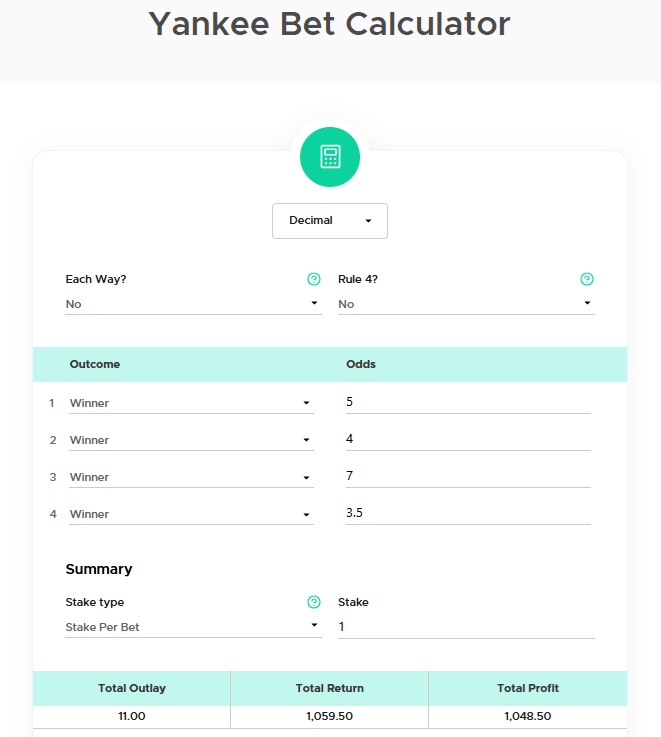
To get a better understanding of how Yankee bets work and a full breakdown of the calculations, read the Yankee Bets article.
Lucky 15 Bets
As we work our way up the ladder through the types of Accumulator bets, the Lucky 15 is next on the list. The Lucky 15 is very much the got to bet for keen horse racing bettors due to it’s potential profits.
A Lucky 15 bet comprises four selections that will create a combination of, you’ve guessed it, fifteen individual legs. That combination is made up of the following:
- 4 Single Bets
- 6 Double Bets
- 4 Treble Bets
- 1 Four-fold Bet
As you can see, the Lucky 15 bet is the same as the Yankee bet but with the addition of Single bets.
The addition of Single bets means you can still get returns on your bet with just one winner. It’s unlikely you’ll cover your stake outlay with one winner but that will depend on the stake used and the odds of the winner.
Let’s look at what the potential outcomes of your Lucky 15 bet might be:
| Outcome | Winning Combination |
| No winners | The bet loses |
| 1 winner | 1 single win |
| 2 winners | 2 singles & 1 double |
| 3 winners | 3 singles, 3 doubles & 1 treble wins |
| 4 winners | 4 singles, 6 doubles, 4 trebles & 1 four-fold wins |
Calculating Lucky 15 Bets
You probably get the idea by now that working out possible returns from these types of bets requires you to multiply the odds of each bet combination.
Therefore, you are going to need to work out the returns/odds for each of the 15 combinations. You then need to add all of those together to get the total odds of your Lucky 15 bet.
Most bookies will display the odds in your bet slip when you enter the stake.
Rather than sweating over sitting and going through the painstaking job of working these things out for yourself, it’s far easier to use the Outplayed Lucky 15 Calculator.
Using the calculator is really quite easy. You just enter the odds of the four selections and the stake you want to use and let the calculator do the business.
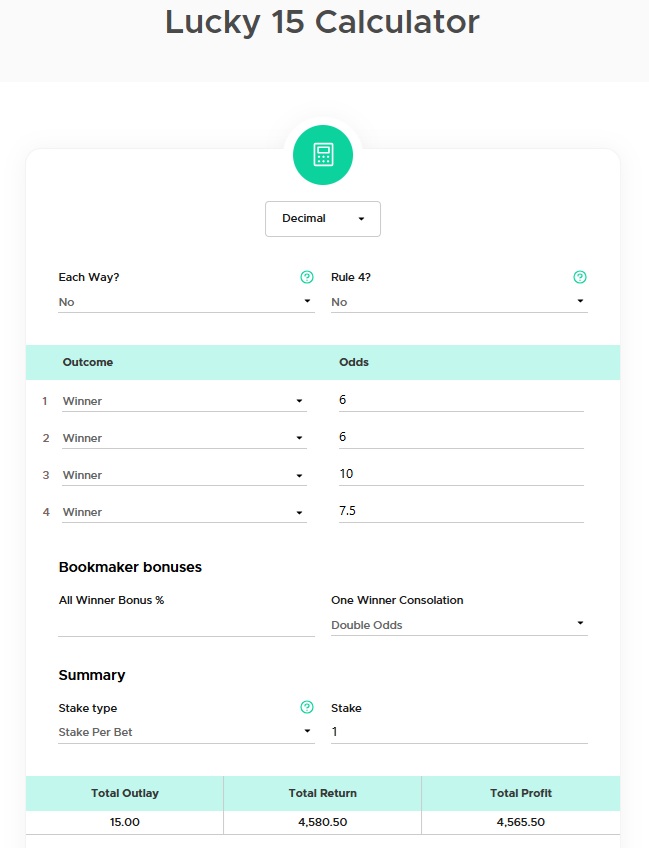
For more information about Lucky 15 bets, what sports to use them on and how to calculate them, have a read of the Lucky 15 Bets article.
Canadian / Super Yankee Bets
A Canadian bet is more often referred to as a Super Yankee due to its similarity with the Yankee bet.
The difference with the Canadian Accumulator bet is that you use 5 selections instead of 4. Those 5 selections are then rolled into one bet made up of 26 individual bets as follows:
- 10 Double Bets
- 10 Treble Bets
- 5 Four-fold Bets
- 1 Five-fold Bet
As with a lot of multiple bet types, any stake you enter will be applied to each individual bet (leg). This means that your total stake will multiply by 26 times.
Two winners from five is the minimum you need in order to get any returns. This would result in a one winning double bet. It’s worth noting, the returns from two winners isn’t likely to cover your outlay. However, it would be possible with higher odds winners.
Whilst the Canadian bet is mostly used in horse racing, it can also be used in a variety of other sports including football, cricket, golf and Formula 1.
You also have the freedom to use different betting markets within the Canadian bet. For example, if there was an action packed weekend of sport, you might consider a bet similar to this:
- Friday Super League: Hull KR to be Castleford
- Saturday Six Nations: France to beat Wales
- Saturday World Darts Championship: Luke Littler to beat van Gerwen
- Sunday Snooker Masters: Judd Trump to beat Kyren Wilson
- Sunday Formula 1: Lando Norris to win the Silverstone Grand Prix
Calculating Canadian Bets
Due to the volume of calculations involved and to avoid any errors, it’s recommended that you use the Outplayed Canadian Bet Calculator to check your potential returns.
If we use the example from above, let’s assume Hull KR win at odds of 4.0, France win at odds of 2.0, Luke Littler wins at odds of 2.5, Judd Trump wins at odds of 3.75 and Lando Norris wins at odds of 4.2.
You then just need to enter those odds into the Canadian Bet Calculator which will look like this:
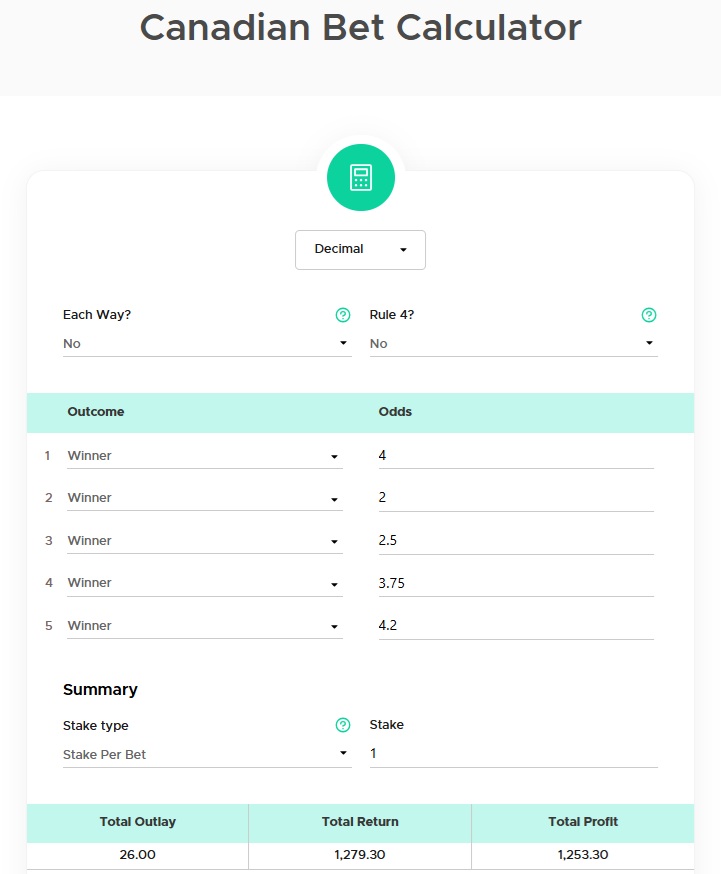
If you really have a hankering for playing with figures, it is possible to manually calculate the winning permutations.
You need to multiply the odds of each leg of the bet. For example, the first double calculation would be Hull KR @ 4.0 and France @ 2.0. The calculation would be 4.0 x 2.0 = 8.0. So, the odds for this double would be 8.0 which you then multiply by your stake. So, a £1 stake would return £8 or a £10 stake would return £80.
You then need to repeat this process for the all of the remaining doubles, trebles, four-folds and the five-fold.
Once you have the sums for each leg, you then add them together to get your overall odds for the Canadian bet.
For a full breakdown of the Canadian / Super Yankee bet calculations and to consider the pros and cons of the bet, take a look at the Canadian Bets article.
Lucky 31 Bets
And on to the next type of Accumulator bet, the Lucky 31. This is very similar to the Canadian bet except you are adding singles to the equation.
This means the bet combination will look like this:
- 5 Single Bets
- 10 Double Bets
- 10 Treble Bets
- 5 Four-fold Bets
- 1 Five-fold Bet
As you can see, the above combinations contain 31 individual bets, hence the name, Lucky 31 bet.
NOTE – Any stake you opt for will apply to each leg of the bet so will multiply by 31.
As you have single bets within the Lucky 31, this means even just one winner will provide returns on your bet. However, you should bear in mind that unless that one winner has mega odds, it’s probable that you will still make a loss overall.
Again, this type of bet is particularly popular in horse racing but there is no reason it can’t be used in football, darts, golf, cricket, rugby etc. In fact, you can pick one selection from 5 different sports or events if you want to mix it up a little.
Calculating Lucky 31 Bets
Because there’s 31 different bet combinations to calculate, you should consider using an online Lucky 31 Calculator. This will help avoid human error and will definitely speed things up for you.
Should you ever need to work things out manually though, you’d need to calculate the odds for each leg of the bet.
To do that, you must multiply the odds in each bet. Here’s an example of how you would do that using 5 horse selections:
- Single 1: Horse A @ 5.0 (odds) = 5.0
You need to repeat this for the other four single bets
- Double 1: Horse A 5.0 x Horse B 3.0 = 15.0
You need to repeat this for the remaining nine doubles
- Treble 1: Horse A 4.0 x Horse B 3.0 x Horse C 4.5 = 54.0
You need to repeat this for the remaining nine trebles
- Four-fold: Horse A 4.0 x Horse B 3.0 x Horse C 4.5.0 x Horse D 8.0 = 432.0
You need to repeat this for the remaining four four-folds
- Five-fold: Horse A 4.0 x Horse B 3.0 x Horse C 4.5.0 x Horse D 8.0 x Horse E 7.0 = 3024.0
Once you have got the odds for all 31 bet legs, add them together to get the total odds of the Lucky 31 bet.
You can gain a more in-depth look at the Lucky 31 bet in the types of bets article.
Heinz Bets
The Heinz bet, also sometimes referred to as a Super Yankee is a combination of 57 bets which is where it gets its name from.
This time, you are adding another selection to your bet so you have 6 picks as the foundation for the Heinz bet. Those 6 selections then create a combination of 57 legs as below:
- 15 Double Bets
- 20 Treble Bets
- 15 Four-fold Accumulators
- 6 Five-fold Accumulators
- 1 Six-fold Accumulator
Without any single bets being involved, you need at least two winners from six to create a winning double. Clearly, the more winners you have, the better the returns.
When you start playing with bet combinations of this size, things can get a little daunting. Don’t get bogged down with the bet combinations and concentrate on which 6 selections to pick.
Calculating Heinz Bets
It is possible to manually calculate Heinz bets but to be honest, we can think of better ways to spend time. The sheer amount of calculations involved would just make a painstaking task.
Therefore, we would always suggest using an online calculator such as the Outplayed Heinz Bet Calculator.
Here’s an example of how the calculator looks and the inputs required:
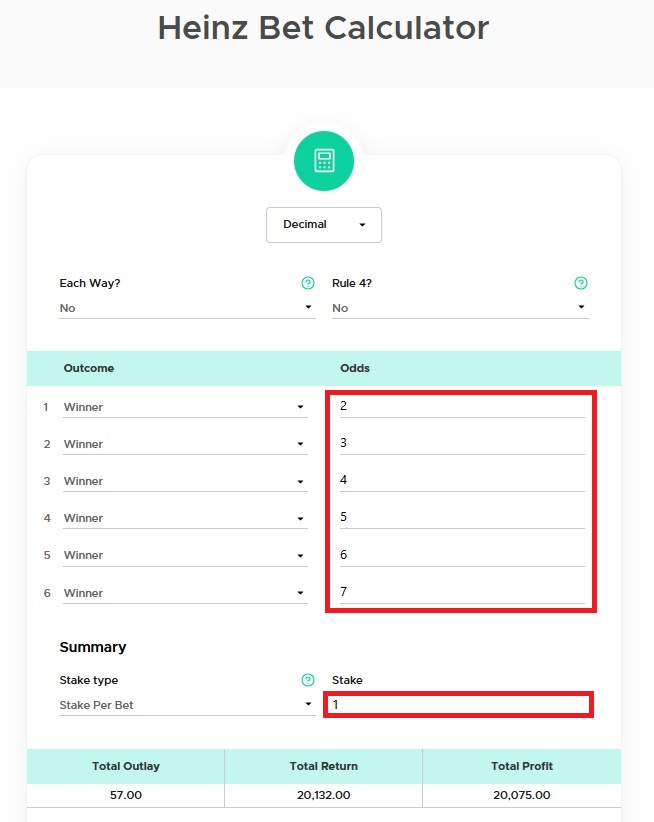
Remember – Any stake will apply to each leg of the bet so your stake will multiply by 57 times.
For further information about Heinz betting and potential strategies, read the full Heinz Bet article.
Lucky 63 Bets
This brings us to the last of the ‘Lucky’ type of bets and on to the next Accumulator bet, the Lucky 63 bet.
The Lucky 63 bet is almost the same as the Heinz bet but with the addition of single bets. Again, you’re picking 6 selections in order to make up the following bet combinations:
- 6 Single Bets
- 15 Double Bets
- 20 Treble Bets
- 15 Four-fold Bets
- 6 Five-fold Bets
- 1 Six-fold Bet
Thanks to the addition of single bets, one winner will see a return on your bet. However, in order to make a profit, you are likely to need at least two winners.
Placing Your Lucky 63 Bet
For ease of showing you an example, we’ll stick to just using horse racing. After you’ve studied the form and decided which six horses you want to back, head to the bookies website to place the bet.
Please note, your six horses need to be from six different races.
Once you have picked your horses and added them to your bet slip, you’ll see the various bet options available.
If using Bet365, you’ll see a ‘More Multiples’ option you can click on. Once you click on that, you will see the Lucky 63 bet as below:
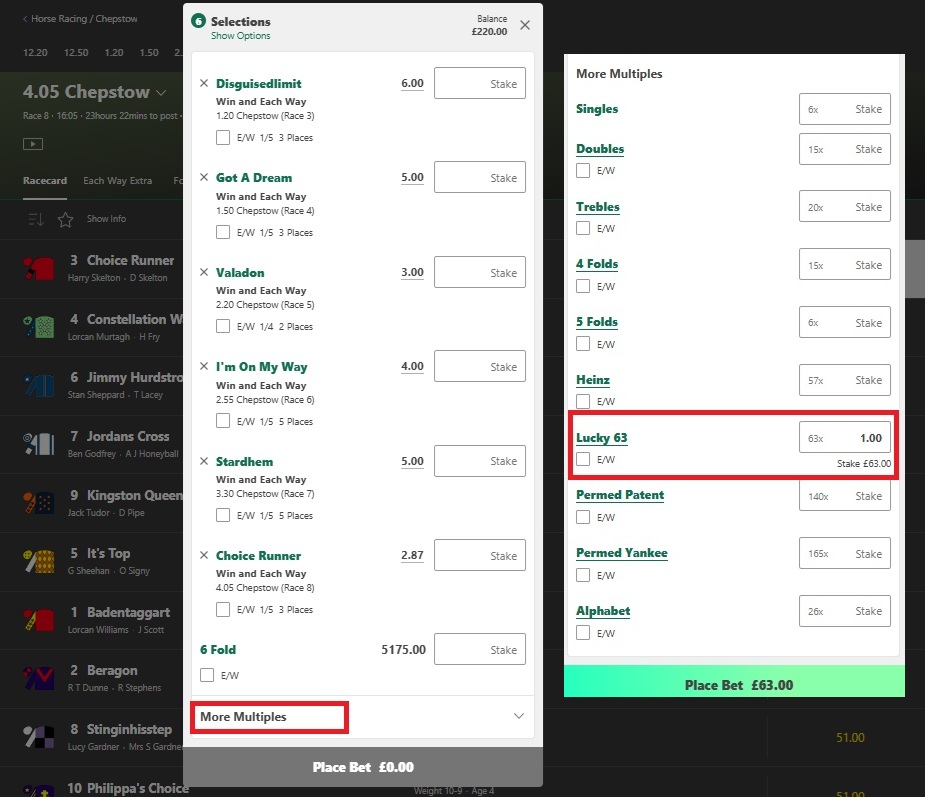
The last step is to enter your stake and place the bet. You might have noticed from the example that a £1 stake will actually cost you £63.
This is because any stake you enter is the amount you’re placing on each individual bet within the Lucky 63.
Calculating Lucky 63 Bets
Things can get a bit tricky if you start manually calculating the potential returns for a Lucky 63 bet. This is because you need to calculate the odds for 63 different bets.
Doing the single is easy as the odds are what they are. When you move onto doubles, you need to multiply the odds of the two selections (horses) by each other. For example:
- Horse A @ 4.0 (odds) x Horse B 5.0 (odds) = 20.0
You would need to repeat this process for all the doubles, trebles etc.
Once you have the odds for all 63 bets, add them together to get your total odds. You then multiply that by your unit stake.
Because this would take a lot of time and could result in human error, it’s always best to use an online Lucky 63 Bet Calculator.
Super Heinz Bets
Things are now getting super-sized with the Super Heinz bet. This bet contains a massive 120 bet combinations.
The Super Heinz requires 7 selections to create the multiple bet combinations:
- 21 Double Bets
- 35 Treble Bets
- 35 Four-fold Bets
- 21 Five-fold Bets
- 7 Six-fold Bets
- 1 Seven-fold Bet
As you can see, there’s no single bets in the Super Heinz so you need a minimum of two winners to see any returns on your bet.
We appreciate that the size of this bet is a little bit scary. Therefore, try to focus your attention on picking the right selections for the bet and let the rest take care of itself.
IMPORTANT - All 7 of your selections for the bet need to be from different events. You can mix and match the 7 between different sporting events or for example, pick 7 different horses from 7 different races.
Calculating Super Heinz Bets
Thanks to the 120 bets involved in a Super Heinz, manually calculating returns and odds can be a nightmare.
The single bet calculations are nice and simple as there’s only one set of odds. It’s when you move on to the doubles, trebles, four-folds etc that the maths gets more intricate.
Here’s an example of a four-fold calculation on a Super Heinz Football bet.
- Liverpool at odds of 3.0 (2/1)
- Brighton at odds of 4.0 (3/1)
- Man City at odds of 2.0 (evens)
- Newcastle at odds of 4.0 (3/1)
The odds for this four-fold element of your bet would be calculated as follows:
Liverpool 3.0 x Brighton 4.0 x Man City 2.0 x Newcastle 4.0 = 96.0
Don’t forget, you would need to do calculations for the other 119 bet combinations.
Once you have worked out the odds for all 120 legs, you would add them together for the total odds of the Super Heinz bet. This is then multiplied by your unit stake to determine the total potential returns if all the bets won.
As we keep re-iterating, doing all of these calculations will take a silly amount of time so it’s much quicker and safer to let technology do the maths for you.
It will take a matter of seconds to enter the information into the Super Heinz Bet Calculator to get the details.
You can also play around with the calculator to work out returns if only some of your selections win.
If you would like a bit more information about placing a Super Heinz bet and the pros and cons of using it, see the Super Heinz article.
Goliath Bets
And finally, on to the last of our Accumulator bets, the Goliath bet. And yes, it really is as mammoth as it sounds!!
Goliath bets need you to pick eight selections which are then rolled into one bet containing an incredible 247 legs.
Here’s how the 247 bet combinations are made up:
- 28 Double Bets
- 56 Treble Bets
- 70 Four-fold Bets
- 56 Five-fold Bets
- 28 Six-fold Bets
- 8 Seven-fold Bets
- 1 Eight-fold Bet
You will need at least two selections to win as there’s no single bets in a Goliath.
NOTE – no two selections can be from the same race or match. All eight selections need to be from different events.
You can place your 8 selections on different markets too if you wish. For example, 2 on football, 3 on horse racing, 1 on boxing, 1 on rugby and 1 on snooker.
VERY IMPORTANT – As with a lot of these larger Accumulator bets, your unit stake multiplies. So a £1 stake will actually cost you £247 so always pay attention before placing a Golath bet.
Calculating Goliath Bets
Looking at it realistically, manually calculating a Goliath bet is a huge drain on anybody’s time.
It would require you to multiply the odds of each selections within each of the 247 bet combinations!!
Therefore, we recommend using the Outplayed Goliath Bet Calculator.
Using the online calculator returns the figures in a fraction of the time and can reduce the risk of human errors.
Summary
Obviously, this article covers a lot of different bets and it’s a lot of information to absorb but there isn’t a bet where one size fits all.
It really is down to the individual and their appetite to risk. However, one thing to consider is your level of experience.
If you’re new to betting, it’s advised that you don’t jump the gun and if you’re interested in placing Acca bets, you should start with standard Accumulator bets. You will soon get up to speed and be comfortable moving on to more adventurous Accumulator bets.
No matter what type of bet you’re considering, you should always do your research and study form to enhance your decision making.
Every type of bet has its advantages and disadvantages. The key is to keep an eye on the odds, consider sports you have a knowledge in and always stick to your budget.
Updated: 17 Oct 2025
The Author
Paul brings over four years of Matched Betting experience to Outplayed. His extensive background in financial services and e-commerce, combined with his expertise in online marketing and Matched Betting, makes him a valuable asset to the team.

